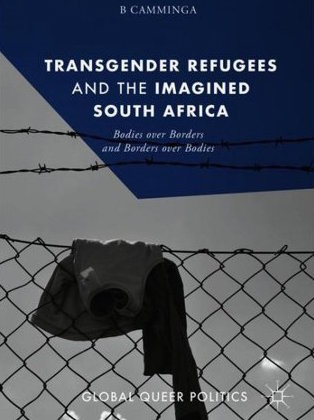This year, academic, activist and friend of Iranti, B Camminga, became the first openly trans person from the African continent to obtain their PhD. Their research project culminated in the publication of a book entitled “Transgender Refugees and the Imagined South Africa: Bodies Over Borders and Borders Over Bodies”. The book, Camminga uses the stories of several transgender and gender-diverse migrants and refugees to explore broader themes of humanity, personhood, and how we might better understand gendered experiences outside of Western and anglophone terminologies.
Iranti recently posed some questions to Camminga to get deeper into the book, and their work as a queer academic in Africa:
WHAT IS THIS BOOK?
The project considers how the concept of “transgender” travelled here to South Africa, and what precipitated its emergence as a political discourse. I look how people who identify as transgender come to South Africa seeking safety as refugees and asylum seekers and what investment they have in this term, “transgender”, in relation to the country that they migrate too. In a sense the book considers how transgender people in South Africa, who I want to stress have always existed, begin to use a particular language to define their expressions of gender and how this may or may not filter into a refugee rights framework.
WHY DID YOU FEEL THIS AREA NEEDED TO BE RESEARCHED?
I have worked with the trans community in South Africa and on the African continent for at least a decade. When I started my PhD journey I wanted to make sure that whatever I wrote would have broad-based impact. I wanted not merely to make a piece of academia for its own sake, but to contribute positively to the lives of some of the community members I have worked with and care for. I knew many of the people who participated in this book, prior to writing it: Their lives are perhaps the most difficult to navigate as trans people given the intersection with being refugees whose very identities are often criminalised or stigmatised in their countries of origin. Moreover, it felt like nobody really considered refugees as part of their constituencies; not just in South Africa or on the African continent but around the world. My hope remains that this book does some of that intervention work, or begins that conversation at least.
GIVEN THAT YOUR RESEARCH PARTICIPANTS COME FROM MANY LINGUISTIC BACKGROUNDS AND THAT EVEN THE WORD “TRANSGENDER” IS INHERENTLY A WESTERN, OR ENGLISH, IMPORT, DID YOU FIND LANGUAGE TO BE A CHALLENGE IN CONDUCTING YOUR RESEARCH?
I think that’s been one of the more interesting elements of the work actually. It’s clear in this book and indeed among my community that there is a way in which we experience being transgender or expressing gender across the African continent, perhaps even across the Global South, that differs from that of the Global North. So in using the word “transgender” it was often a task of figuring out what exactly that might mean for each person doing so.
WHAT ROLE DOES THE ONGOING CRIMINALISATION OF TRANSGENDER BODIES IN MUCH OF THE CONTINENT PLAY IN MIGRATION OR ASYLUM SEEKING FOR THE PEOPLE YOU SPOKE TO?
A key role! Criminalisation in combination with other factors is really what forces people to leave or seek refuge elsewhere. It’s often not just that trans people are harassed, attacked or threatened with violence but that there is no recourse to protection when threatened or attacked. So, not only do people attack or mistreat trans people because they can do so with impunity, but the feeling of being helpless and in danger for a trans person is a key deciding force in leaving. Transgender people are often exceedingly visible in communities and by extension they bear the brunt of any antagonism that exists towards non-conformity.
WHAT POSITIVE OR HOPEFUL ELEMENTS EXIST IN THE LIVES OF THE TRANS PEOPLE IN YOUR BOOK?
If I am honest there are very few positives. I have seen one or two things that give me the slightest bit of hope, for instance a small business, a chicken farm, being run by a group of transgender refugees in Kenya which is providing a livelihood for them in relative safety. There are people who find ways to endure, some who even find a way to thrive, but that’s not more than a handful. Strangely, and I point this out in the book, those most likely to have some positive experience are those who ‘finesse’ the legal system: figure out how to stay in relatively safe countries without actually becoming refugees or asylum seekers. Often staying “off the grid”, especially in South Africa, has allowed transgender people coming from abroad more freedoms than the restrictive bureaucratic process allows.
DID ANY PARTICULAR STORY FROM YOUR RESEARCH STAND OUT TO YOU?
There are so many great stories in this book, even if I do say so myself. Stories about people wanting to just live and thrive in the most beautiful and imaginative ways but really struggling to get there. People being threatened with the injection of petrol; crossing vast deserts; meeting friendly truck drivers along their journeys; experiencing the purgatory that is queueing outside Home Affairs; and stories about how parents and sometimes even communities are sources of support and care for gender non-conforming children. I think, perhaps, what has stuck with me in general about these stories is that not one narrative is the same. People, have hugely different and varied experiences and it’s not a singular tale of hate and oppression for trans people in any given community. It’s a combination of things that bring people to the point of needing to leave, and everyone I spoke to has dealt with those things in their own, unique ways.

For more on B Camminga’s new book, read their recent interview with the Nal’ibali Reading For Enjoyment Campaign as published in TimesLive: https://www.timeslive.co.za/sunday-times/books/news/2019-05-06-b-camminga-talks-transgender-refugees-in-south-africa/
Or order the book online and read a brief extract at the publisher, Palgrave MacMillan: https://www.palgrave.com/gp/book/9783319926681
